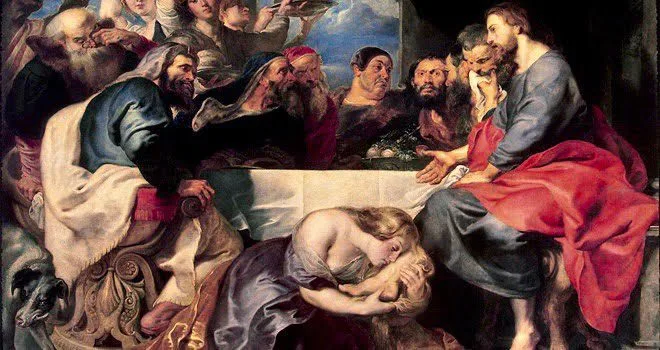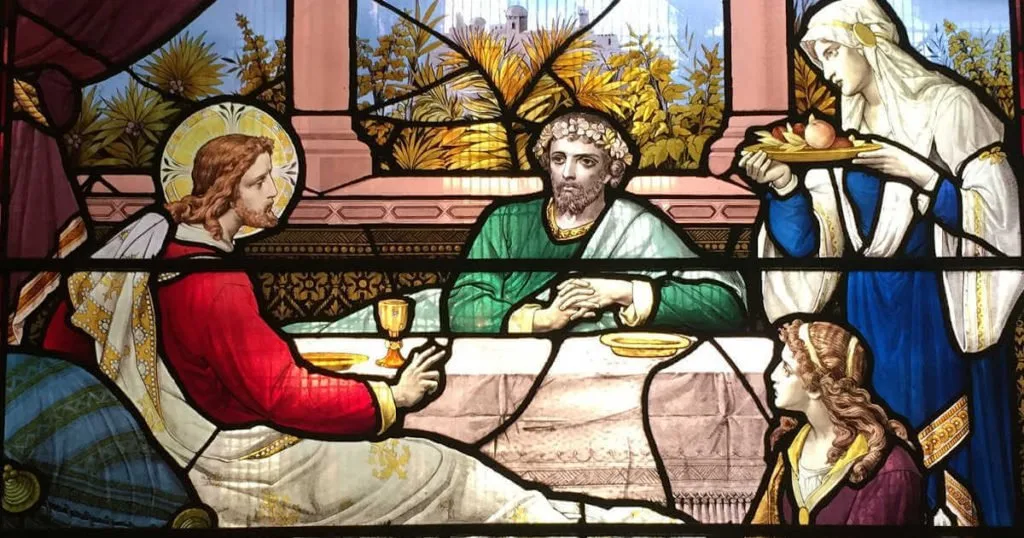HOLY MONDAY READINGS AND REFLECTION:
THE DAY AFTER JESUS’ TRIUMPHAL ENTRY INTO JERUSALEM.

HOLY MONDAY MASS READINGS
READING I
Is 42:1–7
Here is my servant whom I uphold, my chosen one with whom I am pleased, upon whom I have put my Spirit; he shall bring forth justice to the nations, not crying out, not shouting, not making his voice heard in the street. A bruised reed he shall not break, and a smoldering wick he shall not quench, until he establishes justice on the earth; the coastlands will wait for his teaching.
Thus says God, the Lord, who created the heavens and stretched them out, who spreads out the earth with its crops, who gives breath to its people and spirit to those who walk on it: I, the Lord, have called you for the victory of justice, I have grasped you by the hand; I formed you, and set you as a covenant of the people, a light for the nations, to open the eyes of the blind, to bring out prisoners from confinement, and from the dungeon, those who live in darkness.
RESPONSORIAL PSALM
R. The Lord is my light and my salvation.
The Lord is my light and my salvation;
whom should I fear?
The Lord is my life’s refuge;
of whom should I be afraid?
R. The Lord is my light and my salvation.
When evildoers come at me
to devour my flesh,
My foes and my enemies
themselves stumble and fall.
R. The Lord is my light and my salvation.
Though an army encamp against me,
my heart will not fear;
Though war be waged upon me,
even then will I trust.
R. The Lord is my light and my salvation.
I believe that I shall see the bounty of the Lord
in the land of the living.
Wait for the Lord with courage;
be stouthearted, and wait for the Lord.
R. The Lord is my light and my salvation.
VERSE BEFORE THE GOSPEL
Let us greet our king; he alone showed mercy for our sins.
GOSPEL
Jn 12:1–11
Six days before Passover Jesus came to Bethany, where Lazarus was, whom Jesus had raised from the dead. They gave a dinner for him there, and Martha served, while Lazarus was one of those reclining at table with him. Mary took a liter of costly perfumed oil made from genuine aromatic nard and anointed the feet of Jesus and dried them with her hair; the house was filled with the fragrance of the oil. Then Judas the Iscariot, one of his disciples, and the one who would betray him, said, “Why was this oil not sold for three hundred days’ wages and given to the poor?” He said this not because he cared about the poor but because he was a thief and held the money bag and used to steal the contributions. So Jesus said, “Leave her alone. Let her keep this for the day of my burial. You always have the poor with you, but you do not always have me.”
The large crowd of the Jews found out that he was there and came, not only because of him, but also to see Lazarus, whom he had raised from the dead. And the chief priests plotted to kill Lazarus too, because many of the Jews were turning away and believing in Jesus because of him.
HOLY MONDAY GOSPEL REFLECTION
A meditation given by Bishop Echevarría on Holy Monday on April 5, 2011
Yesterday we recalled Christ’s triumphal entrance into Jerusalem. A great crowd of his disciples and other persons acclaimed him as the Messiah and King of Israel. At the end of the day, exhausted, he returned to Bethany, a village close to the capital, where he was accustomed to stay on his visits to Jerusalem.
A family of friends living there always had a place for him and his companions. Lazarus, whom Jesus raised from the dead, is the head of the family. With him live his sisters Martha and Mary, who fondly await the Master’s arrival, happy to be able to serve him.

In the last days of his life on earth, Jesus spent long hours in Jerusalem preaching intensely. In the evening, he recovered his strength in the home of his friends. And in Bethany there took place an episode described in the Gospel of today’s Mass.
Six days before the Passover, St. John tells us, Jesus came to Bethany, where Lazarus was, whom Jesus had raised from the dead. There they made him a supper; Martha served, and Lazarus was one of those at table with him. Mary took a pound of costly ointment of pure nard and anointed the feet of Jesus and wiped his feet with her hair, and the house was filled with the fragrance of the ointment.
SHE SPARED NO EXPENSE
We immediately see the generosity of this woman. She wanted to show her gratitude to the Master for having restored her brother to life, and for so many other gifts they had received. And she spared no expense. Judas, present at the supper, carefully calculated the price of the perfume. Instead of praising Mary’s refinement, he voiced a criticism: “Why was this ointment not sold for three hundred denarii and given to the poor?” In reality, as St. John notes, he was not concerned about the poor. His interest was in handling the money of the common purse, and stealing from it.
“But Jesus own reaction is completely different,” writes John Paul II. “While in no way detracting from the duty of charity towards the needy, for whom the disciples must always show special care—the poor you will always have with you (Mt 26, 11; Mk14:7; cf. Jn 12:8)—he looks towards his imminent death and burial, and sees this act of anointing as an anticipation of the honor which his body will continue to merit even after his death, indissolubly bound as it is to the mystery of his person” (Ecclesia de Eucharistia, 47).
GOD HOLDS FIRST PLACE
To be a true virtue, charity has to be ordered. And God holds first place: You shall love the Lord your God with your whole heart and with your whole soul and with your whole mind. This is the first and greatest commandment. The second is like unto it: you shall love your neighbor as yourself.
On these two commandments depend the whole Law and the prophets. Therefore, it is a mistake to overlook the needs of the Church and her sacred ministers, using as an excuse the desire to alleviate the material needs of men. As St. Josemaría writes:

“That woman in the house of Simon the leper in Bethany, who anoints the Master’s head with precious ointment, reminds us of our duty to be generous in the worship of God.
—All beauty, richness and majesty seem little to me. —And against those who attack the richness of sacred vessels, of vestments and altars, stands the praise given by Jesus: opus enim bonum operata est in me—she has acted well towards me.”
LOVE FOR GOD AND LOVE FOR NEIGHBOR
How many people act like Judas. They see the good that others are doing, but they don’t want to acknowledge it. They try to find twisted intentions, to criticize, to gossip, to make rash judgments. They reduce charity to the purely material—giving a few coins to the needy, perhaps to quiet their conscience—forgetting that, as St. Josemaria also wrote, “Christian charity cannot be limited to giving things or money to the needy. It seeks, above all, to respect and understand each person for what he is, in his intrinsic dignity as a man and child of God.”
The Virgin Mary dedicated herself completely to our Lord, and was always concerned about the needs of those around her. Today we ask her to intercede for us, so that, in our own lives, love for God and love for neighbor will merge into a single reality, like the two sides of a coin.
TEXT SOURCE: https://stjosemaria.org/commentaries-on-holy-week-monday/
GOSPEL COMMENTARY
Commentary
Mary and Judas both sensed the same aroma: the “good aroma of Christ” (cf. 2 Cor 2:15). But the fragrance that issued from each one’s heart was very different. And so their way of welcoming the gift of Jesus’ love was also very different.
Our Lord knows that his time on earth is coming to an end. He has come to love us “to the end” (cf. Jn 13:1), as Saint John will tell us in the chapter immediately after the one we are reading today. And therefore, because he has come to love, in this sublime moment his heart is especially sensitive to the signs of love that he receives.
Mary expresses her love without reserve. She isn’t aware of everything that is going to happen in the next few days, everything that the Paschal Mystery will entail. But her feminine intuition tells her that something important is about to take place.
Her love is shown without conditions, without haggling, without human calculations. She has received so much love from Jesus, and the only thing that matters to her is trying to imitate his way of loving by giving everything she has: her best perfume, her comely hair. Because feminine beauty can also be – should be – a tribute to God.
Judas has also has received so much love from Jesus. But his heart has been gradually closing itself to that source of light and warmth. And now his soul is dark and cold. Hence neither the finest of fragrances nor our Lord’s warmest smile can make him react. His senses are so distorted, his life is so confused, that he will end up agreeing to sell Jesus for thirty coins, when, as he himself says, the perfume alone was worth three hundred denarii.
Fully immersed in Holy Week, we can approach the Easter Mystery, now imminent, by considering our own lives in the light of the two people the Church presents to us today. Like them, we too have received so much love from Jesus. With sincerity, with courage, let us ask ourselves if we are really giving back everything we have to our Lord: soul, body, time and heart. Only by breaking the vessel, without holding anything back, can we cry out with Saint Paul: “Thanks be to God, who in Christ always leads us in triumph, and through us spreads the fragrance of the knowledge of him everywhere” (2 Cor 2:14).
Author: Luis Miguel Bravo Álvarez
Source: https://opusdei.org/en-us/gospel/2024-03-25/
VIDEO COMMENTARY
TOPIC: IS YOUR LOVE FOR GOD EXTRAVAGANT?
In today’s gospel reading, the week of Jesus’ own passion and death, He spends time in the house of siblings Mary, Martha and Lazarus. Representing the gratefulness of the family to Jesus for raising Lazarus from death, Mary anoints the feet of Jesus with very expensive perfume, drying His feet with her hair. Judas sneered at her extravagance, criticizing her waste of money that could have been given to the poor. Either Judas was missing the point or he was projecting his evil intent. After all, he was the treasurer of the apostles. He could help himself with the money he was entrusted with, stealing a bit here and there. We have two important points we should ponder on this Holy Week.
Stay updated: subscribe by email for free TO OUR NEW WEBSITE www.catholicsstrivingforholiness.org (PUT YOUR EMAIL IN THE SUBSCRIBE WIDGET).
We are also in www.fb.com/Catholicsstrivingforholiness. Kindly help more people in their Christian life by liking our page and inviting your family, friends and relatives to do so as well. Thanks in advance and God bless you and your loved ones! Fr. Rolly Arjonillo